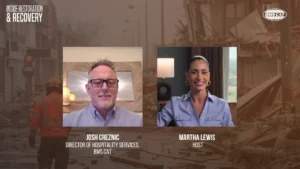Right now, 80% of the hotel rooms in the United States stand empty. As occupancy rates continue to plummet and fear rises, industry leaders are looking to the future for hope and preparing for what comes next. How will the modern traveler’s needs shift? Where can hoteliers find advantages in a recovering market?
In the answers to those questions, common thought patterns are emerging and leaders are finding some consensus about what the future of hospitality looks like. Here are 5 predictions about how hospitality is evolving—and how your business should, too.
1. Guest safety is the next big competitive advantage: the more proactive you are, the quicker you’ll recover.
Certified safe places such as regulated hotels will become popular and home rentals without safe ratings will fall away. Airbnb will struggle. Hotels will have a new normal of much lower occupancy.
At least for a while, the new normal in the hospitality industry will be finding ways to raise occupancy rates to their former numbers. Simply telling people you care about their safety will not be enough; you’ll need to have concrete proof your property is a safe space.
New safety standards and laws are bound to pass, and compliance will be essential. If you can show guests that you have top-level safety measures in place, you’ll not only outpace your direct competition—you may take back some of the guests you’ve lost to short-term rentals as well.
2. But it’s not just about bookings. Safety will also be a top driver of technological innovation and guest satisfaction.
From a technology perspective, there’s going to be a lot more of a boom on [the] Internet of Things (IoT) and sensors.
— Alex Ajdelsztajn, Director of Property Internet at Marriott
Places that are built for gathering are now going to be focused on keeping people safely apart and catering to guests who are much more likely to be worried about germs and interpersonal interactions. So how can you keep guests happy and safe while on property?
According to Ajdelsztajn, IoT devices and sensors are going to become increasingly important. Not only will they equip hoteliers to monitor cleanliness and distancing, they’ll display your commitment to safety in a tangible way—and the value of that can’t be overstated.
3. Flexibility and transparency will be key to enticing people back to travel.
Once things are getting better, there will still be a lot of uncertainty. Can you travel and is it safe to travel? Flexibility will be very important for quite some time. To give more transparency on the rates – are they flexible, and how flexible are they?
There’s likely going to be a long period of time between lockdown and full recovery. In the interim, people are going to be more hesitant to travel, but not for lack of want. In fact, people are desperate to get out of their homes and resume normal life, including travel. But they’re also scared.
Beyond health worries, they’re facing financial uncertainty and won’t be prepared to pay steep cancellation fees or risk a refund while the world remains unstable. That leaves hospitality companies with a unique challenge: enticing travelers to book.
Flexibility and transparency are the key. Be completely clear about your policies regarding booking changes and cancellation upfront and loosen penalties. As a result, guests will feel more secure and booking rates will rise.
4. Properties will need to create both spaces where people can gather and spaces where people can distance.
Physical spaces will morph to ensure the utmost of cleanliness and space between people so that people can socialize, work, and interact with the ability to moderate their sense of distance. As time develops, the hospitality industry is going to have to adapt to people needing and wanting to plug in and out of socialization.
At least for a while, people are still going to need to distance themselves from one another even after the country reopens. Yet, they’ll also need to return to some level of normal social interaction. As a result, hoteliers are in a bit of a bind, left to meet and balance both needs.
Explore how you can create both types of spaces at your property, and give guests the freedom to choose how they spend their time. Consider restricting some common areas with capacity maximums while leaving others open to host meetings, events, and more. Guests will not only appreciate the extra consideration but may also be more likely to recommend your property to others looking to travel in the new world.
5. The only way to prepare for a rapidly-evolving, unpredictable new travel market? Innovation.
There is a plethora of easy-to-implement solutions that can help us overcome the current crisis. The timing is on our side for catching up with what technology can offer our industry. The ones that do this not only will weather this unprecedented crisis but will also come out stronger and more equipped to deal with a completely new travel market.
There are plenty of common sense measures hoteliers are taking during this time to stay afloat: preserving cash, reducing costs and searching for new revenue sources, just to name a few. Meanwhile, the long-term future of the travel market will remain in constant flux until the crisis subsides, making it difficult to do much more than wait. Right?
Wrong. By investing in innovation—whether it’s repositioning internal teams and processes or finding technology that can power your comeback strategy—you’ll be more prepared to handle the industry’s evolution, no matter how much it shifts.
There you have it: the future of hospitality is in safety, flexibility, and innovation. As you plan for the future, keep in mind how you can begin to weave them into your long-term strategies. Remember, these aren’t just trends; they’re seismic industry shifts that are likely here to stay.
Meanwhile, if you’re looking to find out more about how you can take immediate steps to help your business bounce back—and build a foundation to future-proof it in the process—check out our blog post, Recouping Losses from a Drop in Occupancy.
Ready to learn more about how INTELITY can help you maximize ROI, staff efficiency, and guest safety?









